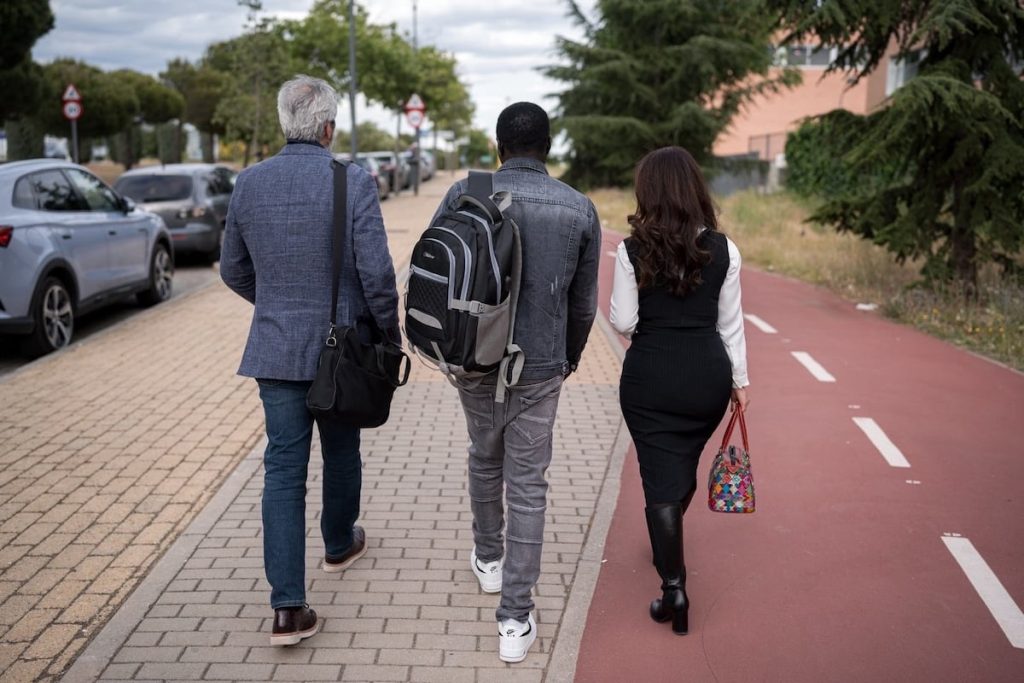Basir, a fictional name for a Sudanese man who survived the tragedy of Melilla in June 2022, landed at Madrid’s Barajas airport this week amidst joy and confusion. After years of fleeing, he finally felt safe, although he had to go through some shocks before finally being able to lay in a bed — the first time in years. His flight from Rabat lasted less than two hours, but it could be a milestone that opens the door to similar cases. In December 2022, he sought asylum at the Spanish embassy in Rabat and, despite government reticence, managed to get the National Court to rule in his favor and compel all relevant bodies to fulfill their obligations. After a year and a half since he applied, the Ministry of Foreign Affairs was forced to bring him to Madrid, the Ministry of Migrations to provide him with accommodation, and the Ministry of Interior to facilitate his asylum request process.
Basir, 25, has been fleeing since he was 15 after an attack in his village in the conflict-ridden South Kordofan region that killed his father and one of his brothers. He was taken in by relatives who never accepted his Christianity and threatened him with death if he didn’t convert to Islam. “If you are a Christian in Sudan, they consider you a pagan and believe they can kill you to do God a favor,” he told EL PAÍS in December 2022. He fled through Egypt, Libya, and Algeria before trying to reach Europe through the Melilla fence. The attempt, involving around 2,000 people, mostly Sudanese refugees like him, led to a brutal reaction from Moroccan security forces (with the involvement of the Guardia Civil) resulting in dozens of deaths and disappearances. Basir, like most survivors, was forced onto a bus that took him to Beni Melal, a city used by Rabat to exile migrants from which it took him months to leave.
Six months later, DEMOS, a Legal Human Rights Study, took on his case and requested the application of article 38 of the Asylum Law at the Spanish Embassy in Morocco, which allows the applicant to be transferred to Spain to seek international protection. This article, applied discretely until now, has benefited Afghan refugees fleeing to other countries but has been very restricted for other cases, especially sub-Saharan Africans in Morocco. After months of his request being ignored, Basir’s lawyers requested a restraining order to bring him to Spanish territory, obtain the necessary safe-conduct, and secure an asylum request appointment after arriving in Spain. The order was granted on February 29th, but it took four more resolutions and almost three months for it to be obeyed. Basir’s lawyers have called his victory a significant precedent for refugees seeking international protection in Spanish diplomatic representations.
Although Basir is beginning to feel calm, he did not have the reception he expected upon arrival in Madrid. While his lawyers waited for him at the airport unable to communicate with him, two National Police agents picked him up at the plane’s door. They forced him to put his phone in his backpack and took him to a room at the airport. Confused and scared as he had not been informed of this procedure, Basir asked to speak to his lawyers but was unsuccessful. Eventually, an NGO representative arrived to take him to the center where he is staying, only then was he able to call his lawyers. The Ministry of Migrations, responsible for the reception, did not respond to questions on whether this is the usual protocol in such cases. In similar situations with Afghan refugees, there was no police intervention, and the first to receive them were NGO employees, as explained by other lawyers familiar with these procedures.


